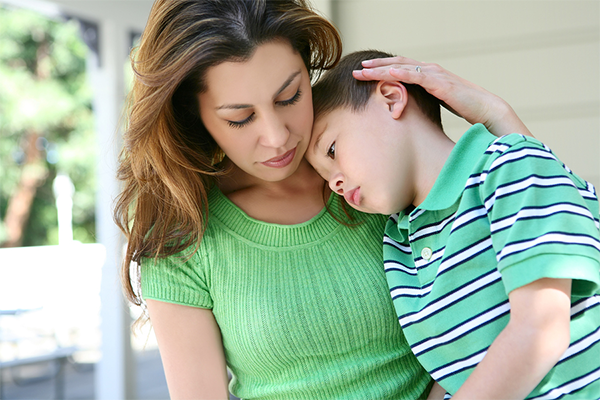How do you tell your child that he or she has cancer?
We talked to Jennifer, Hudson’s mom, and Danielle, Lucas’ mom—both parents of children receiving treatment for leukemia at the Children’s Hospital of Georgia—for their help in how to say one of the hardest things ever for any parent.
Start With the Truth
Both moms say that it’s best to tell your child the truth, even if you don’t necessarily use the word cancer.
Hudson was just 4 when he was diagnosed, so Jennifer explained to him that he was sick and would need to go to the hospital. Hudson turned 5 in June, but “I honestly don’t even know if he truly understands the word ‘cancer’ at this point,” she said.
Three years can make a big difference, so for 7-year-old Lucas, Danielle was upfront. “I think it’s better for them to know what’s happening,” said Danielle. “It’s more scary for a child not to know and to have no idea why they have to go to the hospital.
“We didn’t sugarcoat things for him. We told him that he was sick and that he had leukemia. He asked what it was, and we said it was bad blood and that he would be receiving medicine quite often that would make him better. He could get sick from the medicine, but it was killing bad things in his body and it was good for him.”
Jennifer also turned to a book to help explain cancer to her son: “It’s called Chemo to the Rescue, and it’s good for any age, honestly.” While it’s geared toward leukemia, the book (available to read online at www.chemo-to-the-rescue.com) explains how chemotherapy works in a kid-friendly way.
Stay Positive
Both moms say they were in tears when they told their children. But Danielle says she tries not to cry in front of Lucas since seeing a parent in tears is going to make a child even more upset: “If I have to cry, I go somewhere else.”
“I try to stay positive,” agreed Jennifer. “I definitely think having a positive attitude helped with how Hudson responded to everything.”
Face the Tough Questions
Hudson once asked Jennifer, “Why does God want me to be sick?”
“That was a hard one,” Jennifer said. “I said, ‘He doesn’t want you to be sick, but He sometimes gives us challenges that we’re strong enough to face.”
Lucas did ask Danielle, “Am I going to die?”
“I was crushed,” said Danielle. “It was so sad that he had to think about this question.” She told her son no. “I told him his body is reacting to the chemo so well that he’s in remission. But he knows he still has to take his maintenance chemo every day so that the cancer doesn’t come back.”
But depending on the circumstances, your answer might have to be quite different. That’s where the help of a counselor is so important, if you’re struggling with what to say and how to say it.
“We haven’t reached out to one, but there have been times when I thought I was going to have to,” said Jennifer, “if not for his questions, then for my own sanity. Never feel like you can’t do that.”
Danielle also made sure to ask doctor and nurses her own questions. “You want to be able to understand so you can explain things to your child,” she said.
Lean On Your Squad
During your child’s treatment and recovery, everything is more limited—time at school, with friends and at activities. Both parents say that now is when you should lean on that community around you, whether that’s grandparents, aunts, uncles, cousins or close friends, who can keep you and your family upbeat. And who can provide that much-needed support to help care for siblings, cook meals, clean the house, and more.
Know Your Child
Some children might want to look everything up on the internet and have a million questions. Others just take it as it comes and don’t ask much of anything. Still others might be super sensitive and become very upset just thinking about cancer.
Even with the best advice, parents just need to go with their gut and say—or not say—what their child needs to know. “Every kid is different. I would say you just need to take it as you feel the time is right,” said Jennifer. “Don’t jump into it because you feel like you need to explain it right then and there. Be honest and open, but remember: There’s no point in thinking the worst, especially when everything is going well. Our goal for our whole family is the keep things as normal as possible.”




